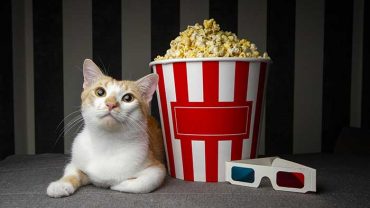Like any other pet, cats will readily help themselves to any homemade food they can find.
Unlike humans, they have no better judgment of what foods are healthy and nutritious for them. It’s easy to blame that on curiosity. But as a pet owner, the onus of feeding a healthy diet to your cat rests squarely with you.
A common question you might have asked yourself at some point in time is, can cats eat popcorn?
Yes, cats can eat popcorn occasionally. Like most homemade foods, you should feed popcorn to your cat only as an occasional treat. You should never make it a regular inclusion in her diet. Neither should popcorn replace some of the essential elements of cat food.
Table of Contents
So, What Does a Cat’s Diet Look Like?
A better way to answer the question, can cats have popcorn, is to begin by understanding what constitutes a cat’s diet.
According to Georgia Veterinary Associates, ideal cat food should meet a certain threshold.
First, the food should be able to react favorably with the cat’s internal organs. That’s to say; the cat should not develop any gastrointestinal complications or organ failure upon eating the food.
Secondly, proper cat food should promote lean weight, strong joints, and healthy teeth. Therefore, you should avoid too many fatty foods and instead, replace them with healthy proteins and minerals like calcium.
Lastly, healthy cat food should also promote the glossiness of your cat’s skin or coat. That’s especially true for the hairless cat breeds.
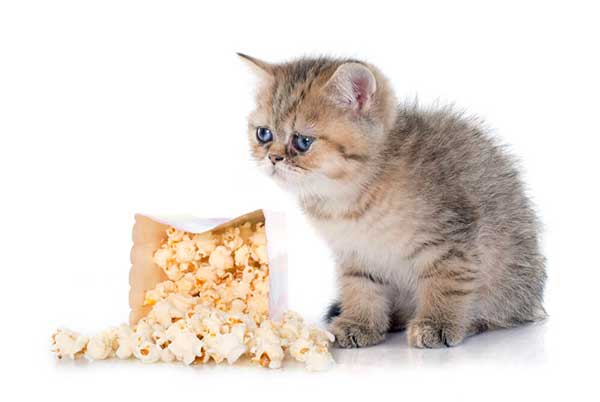
So, what should an ideal cat food comprise of?
Water is the most critical component of cat food. It drives nearly all physiological functions in your feline’s body. These functions range from respiration to digestion, excretion, and all manner of cellular functions.
On the other hand, your cat loses water through numerous ways such as perspiration, urination, and lactation for breastfeeding cats.
Therefore, you shouldn’t just ensure your cat food contains enough water. You should also allow the cat easy access to drinking water all the time. Remember that when it comes to water, there’s no overdose.
The next most critical element of cat food is protein. It supports your feline’s bones, muscles, tendons, and ligaments.
Proteins also facilitate the functions of various hormones, enzymes, and neurotransmitters. The top three sources of protein include meat, fish and poultry.

Next is essential fatty acids, also known as fats. Fatty acids provide your furry friend with a sufficient energy boost.
Cats suffering from fat deficiencies may exhibit symptoms such as dry hair, stunted growth, irritability, and a generally compromised immune system. But unlike proteins, cats do just fine on small daily doses of fatty acids. Usually, their recommended daily intake of essential fatty acids is between 20 and 40%.
We also have vitamins whose primary function is boosting your cat’s immunity. Vitamins mostly work by reducing cell damage that results from free radicals.
The last component of cat food is minerals. These include calcium, magnesium, sodium, copper, iodine, zinc, potassium, and phosphorus. Collectively, they regulate enzymatic functions, acid-base balance, and contribute to the formation of tissue structures.
Now, having looked at the chief components of a feline’s diet, where does that leave popcorn? Is popcorn bad for cats? Let’s look at some common benefits of popcorn.
Health Benefits of Popcorn
The first obvious benefit of popcorn is the pleasant smell. However, there’s more to it than just the scintillating aroma.
The following are some other possible benefits of popcorn that your cat may enjoy.
1. Great for Weight Loss
Right off the bat, let me stress that this is still a debatable issue. The conventional wisdom is that popcorn is low in fat compared to other foods prepared in the same way.
According to the Academy of Nutrition and Dietetics spokesperson, 3 cups of air-popped popcorn should ideally contain 110 calories and one gram of fat.
But as we’ve mentioned, this still a largely contestable fact. That’s because there aren’t any recommendations yet on the amount of oil to use in the preparation of popcorn. Also, most people often undo these low-fat, high-calorie benefits by adding extra fat and butter.
2. Packed With Essential Vitamins and Minerals
Popcorn contains lots of essential vitamins and minerals for your cat.
The most notable one is iron. Iron performs various functions in your feline’s body, including forming the cat’s hemoglobin, which facilitates the ease of oxygen transportation around the cat’s system.
Apart from iron, popcorn boasts a substantial amount of other minerals such as calcium, potassium, magnesium, phosphorus, manganese, copper and zinc. Each of these minerals plays a significant function in your cat’s overall wellbeing.
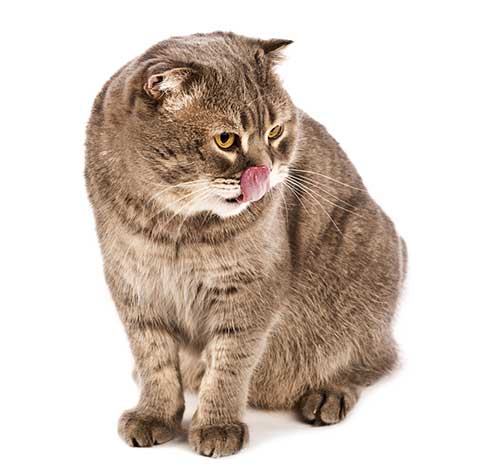
In addition to minerals, popcorn is also rich in vitamins such as niacin, riboflavin, pantothenic acid, folate, and thiamine. These vitamins are associated with disease prevention.
Multiple research studies have linked popcorn to reduced risks of heart disease and cancer. Polyphenols in popcorn hull are remarkably high in anti-inflammatory and antioxidant properties.
Therefore, they’re highly efficient at preventing the proliferation of malignant cells, as well as reducing inflammations associated with cancerous tumors.
Popcorn hulls are also high in zeaxanthin, lutein, and beta-carotene. These compounds have been shown to promote vision.
3. Improves Digestion
This is one benefit of popcorn that your cat will enjoy almost immediately after snacking on the food.
Popcorn is a whole grain, which means it contains the endosperm as well as the germ and the bran. The bran is of special importance, as it contains the fiber that improves bowel movement.
Bran also contains B complex vitamins, vitamin E, and a host of other minerals. A snack of popcorn will stimulate peristaltic motion in your cat’s intestinal muscles, while also inducing the secretion of digestive juices.
As a result, your cat’s bowel movement will be as regular as a clockwork. And that will go a long way in helping the cat overcome common digestive issues such as constipation.
Is Popcorn Toxic To Cats?
Any food is potentially dangerous if you offer it to your cat in excess. And the same applies to popcorn.
You should remember that your feline friend can obtain nearly all her nutritional requirements from the regular cat food in the stores.
So, as we mentioned earlier, you should offer popcorn to your cat only as an occasional treat.
? You should be very worried if your cat sneaks up behind your back and helps herself to a large amount of popcorn.
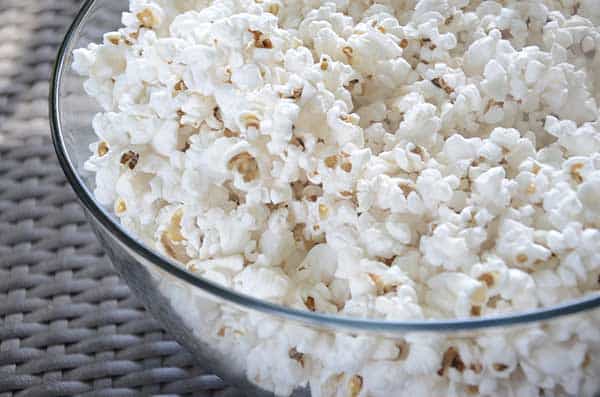
The first, and most obvious drawback, of giving popcorn to your cat is that it presents a choking hazard.
Popcorns are hard enough for most of us to chew. Now, imagine how risky that would be to your little furball, considering cats usually gulp down their food whole.
So, you may be wondering – between popped and unpopped popcorn, which is the best form for my cat? Can cats eat air popped popcorn?
? Experts advise that you shun unpopped popcorns as they may be hard for your feline’s teeth. That means air popped popcorns are the best for your cat.
Another common risk of cats eating popcorn is that it takes time to digest. Remember that it’s fine to offer a small portion of popcorn to your furry friend so that she can enjoy the rich fiber content in it.
However, problems could arise if the cat eats more than enough for her stomach to digest. In such cases, the effects could be counterproductive.
So, while you may have intended to help your feline have more efficient bowel movement, you could be unknowingly exposing her to constipation. And being a starch-based grain, cats don’t have the right enzymes in their saliva to digest carbohydrates in that form.
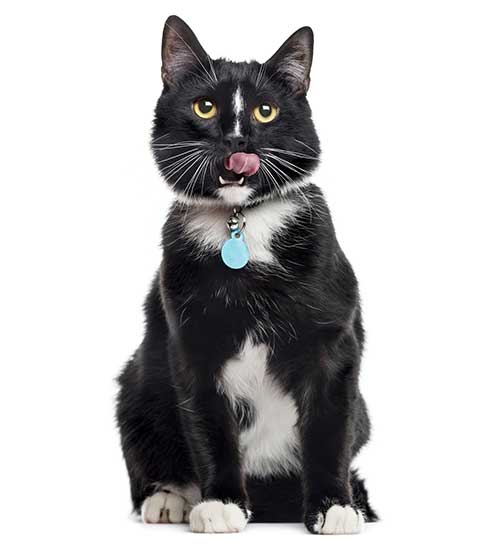
Depending on how popcorn is prepared, it could have worrying levels of fats, sodium, and other artificial additives. These could cause severe gastrointestinal complications to your cat.
Therefore, be very careful about the variety of popcorn that you feed your cat. You should avoid ingredients like onions, chili, and butter.
Now, that brings us to the question, can cats eat caramel popcorn? Like salt, spices and excess fats, caramel isn’t a healthy ingredient. Therefore, avoid feeding your cat any caramel popcorn.
What Should I Do If My Cat Eats Popcorn?
The first sign to watch out for is choking. If this doesn’t happen after a couple of minutes, put the cat under close surveillance for any signs of gastrointestinal complications.
Some common digestive issues that could result from eating excess popcorn include constipation, nausea, vomiting, and diarrhea.
Most of these digestive issues are caused by excess salt, fats, spices, and dairy toppings. You should also want to watch out for other symptoms such as loss of appetite, irritability, lethargy, and elevated body temperature.
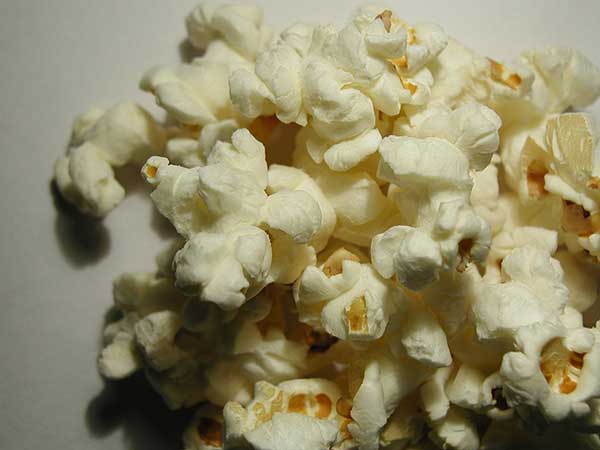
Remember that even if your cat doesn’t present any noticeable symptoms, you might still want to take that trip to the vet.
Common ingredients in popcorn, like salt, could have long-term organ damage. Not only does salt cause dehydration, it also impairs liver and kidney functions. Plus, excess sodium is associated with elevated blood pressure and seizures.
The best way to avoid these unfortunate scenarios is to prevent your cat from eating popcorn in the first place. You can do that by ensuring the food is always covered such that the cat can’t access it.
And whenever eating popcorn, avoid doing so in front of your cat, as that will stir her cravings for the food.
So, Can Cats Eat Popcorn?
Cats can definitely eat popcorn, whether air-popped, white cheddar popcorn, or any other popcorn. The problem comes down to the topping. For instance, dairy toppings aren’t recommended as cats are lactose intolerant.
Also, avoid any popcorn seasoned with spices, condiments, and other artificial sweeteners.
Remember that cats cannot taste sweeteners like sugars and salts. Therefore, they will readily gulp down popcorn laden with these sweeteners. You may not realize she did until it’s too late.

